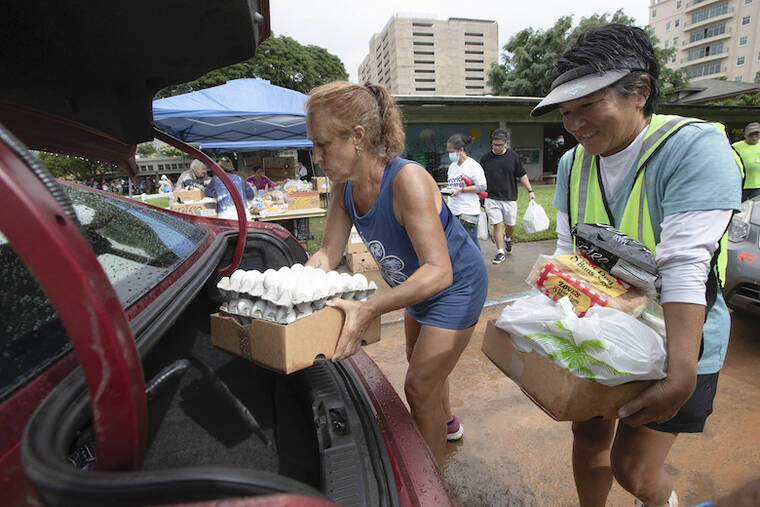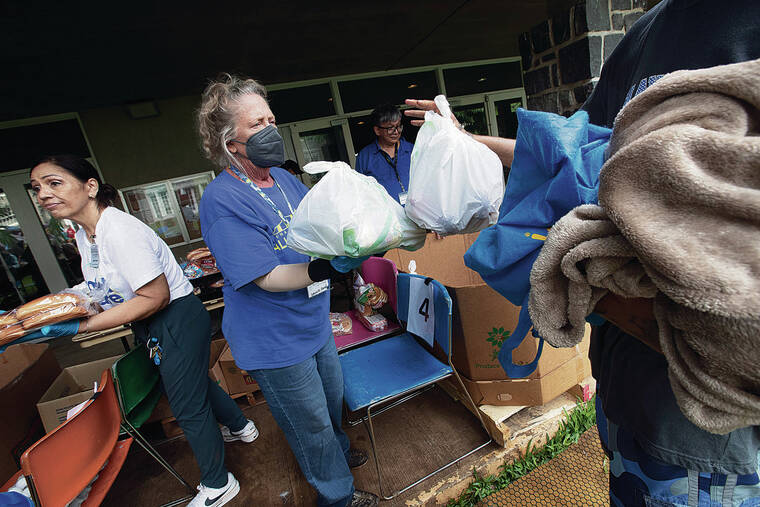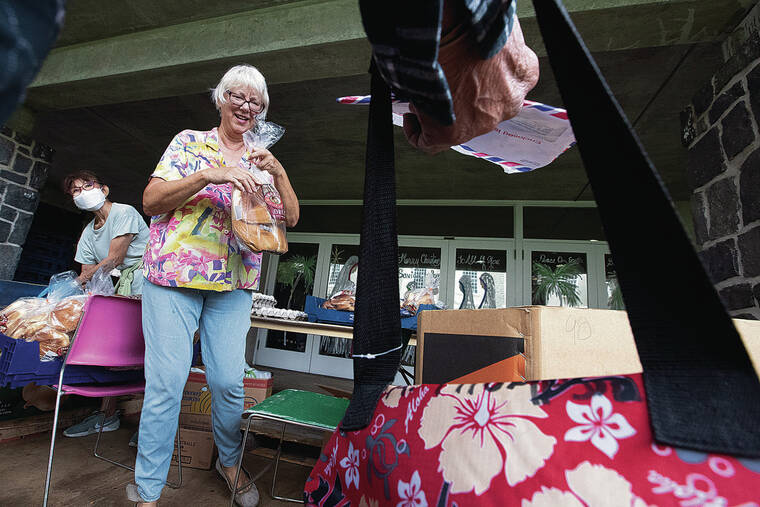Nearly 600 EBT cardholders in Hawaii victimized by fraud

GEORGE F. LEE / GLEE@STARADVERTISER.COM
Central Union Church has seen an uptick in demand for its weekly food distribution. Volunteers Marlyn Breeden, left, and Celeste Oda hustled boxes of food into the trunk of a car on Wednesday.

GEORGE F. LEE / GLEE@STARADVERTISER.COM
Volunteers Kehau Flores, left, and Laura St. Denis handed out packages of food.

GEORGE F. LEE / GLEE@STARADVERTISER.COM
Volunteer Rebecca Woodland handed out bread Wednesday at Central Union Church’s food distribution on Punahou Street. The church began the “Serving Aloha” program in 2020 to help those battling food insecurity during the COVID-19 pandemic.

GEORGE F. LEE / GLEE@STARADVERTISER.COM
A person ate from a can after receiving it during Wednesday’s food distribution.




Cybercriminals have accessed funds from nearly 600 Electronic Benefits Transfer cards in Hawaii, more than double the number recently reported, as food insecurity intensifies during the holidays.
State residents in early November first reported fraudsters stole funds from their EBT cards, which are used as debit cards for the monthly federal Supplemental Nutrition Assistance Program.
At the time, the state Department of Human Services, which administers the program, reported at least 242 EBT cards had been compromised, mostly from urban Honolulu.
As of Wednesday, that number grew to 592 reports of lost benefits related to possible EBT fraud.
DHS officials said the majority — 566, or roughly 96% — have received full or partial replacement of SNAP benefits, while seven requests, or 1%, were denied, and 19 requests, or 3%, remain under review.
The Honolulu Police Department said investigations into the cases are ongoing.
Don't miss out on what's happening!
Stay in touch with breaking news, as it happens, conveniently in your email inbox. It's FREE!
“While the cause has not yet been determined, EBT cardholders should be careful when utilizing their cards at retail checkout or ATM locations,” DHS officials said in a statement, “and visually inspect card readers for signs of skimming devices, tampering or anything that appears out of the ordinary. In addition, DHS reminds all EBT cardholders to be vigilant and regularly check card balance for any unusual transactions.”
The department also encourages EBT cardholders to avoid using simple PINs such as their birth date, and to regularly change them.
When not in use, EBT cardholders may freeze their card, and block online or out-of-state transactions.
EBT cardholders who notice unusual transactions or lost benefits should visit a DHS Processing Center to report it as soon as possible, and submit a request for replacement of their SNAP benefit and card. Federal law requires states to replace SNAP benefits stolen via card skimming, cloning and other fraudulent activity.
The Hawaii Foodbank and its partners, meanwhile, are seeing an uptick in need as the holiday season gets underway.
The need is growing
“The need has really gone up, especially on Oahu,” said Amy Marvin, president and CEO of Hawaii Foodbank, which is one of seven community-based SNAP outreach providers.
In the spring, the food bank was serving an average of 120,000 individuals, which went up to about 140,000 the past two months.
One of its partners, Central Union Church in Honolulu, also has seen an uptick in demand for its weekly food distribution on Wednesdays.
The church began the program, “Serving Aloha,” in 2020 to help those battling food insecurity during the height of the COVID-19 pandemic and continues to do so.
The food bank supplies the church with food, including fresh produce, which volunteers package and distribute for free.
Coordinator Martha Balkin says the program is serving up to 730 people on Wednesdays.
Hawaii food insecurity seems to not only have persisted, but to have increased this year.
Marvin said this is largely due to higher food prices, and possibly the delayed impacts of some federal COVID-19-related programs ending, among other factors.
People make a number of compromises or rack up debt on credit cards before turning to a food bank.
Some displaced Maui residents may have moved to Oahu to live with family, resulting in doubled-up households.
The food bank is finding many first-timers in line, along with working parents and people who work more than one job, struggling to make ends meet.
“We call them impossible choices,” she said. “Put food on the table or gas in the car to go to work or go to a doctor or pay for medication.”
The tragedy of the Maui wildfires on Aug. 8, along with the displacement of thousands, also has driven up needs statewide.
In the aftermath of the fires, the Hawaii Foodbank held donation drives for Maui survivors, and staff members went over to the island in August to provide logistical support for the Maui Food Bank.
Coping with one tragedy on top of another compounds the challenges of food insecurity when many are still in recovery mode from the pandemic.
“We already had these really high existing levels of food insecurity,” she said. “The need’s still there. The need’s growing across the state, not just on Maui.”
To have EBT funds stolen from vulnerable residents makes these challenges even greater.




